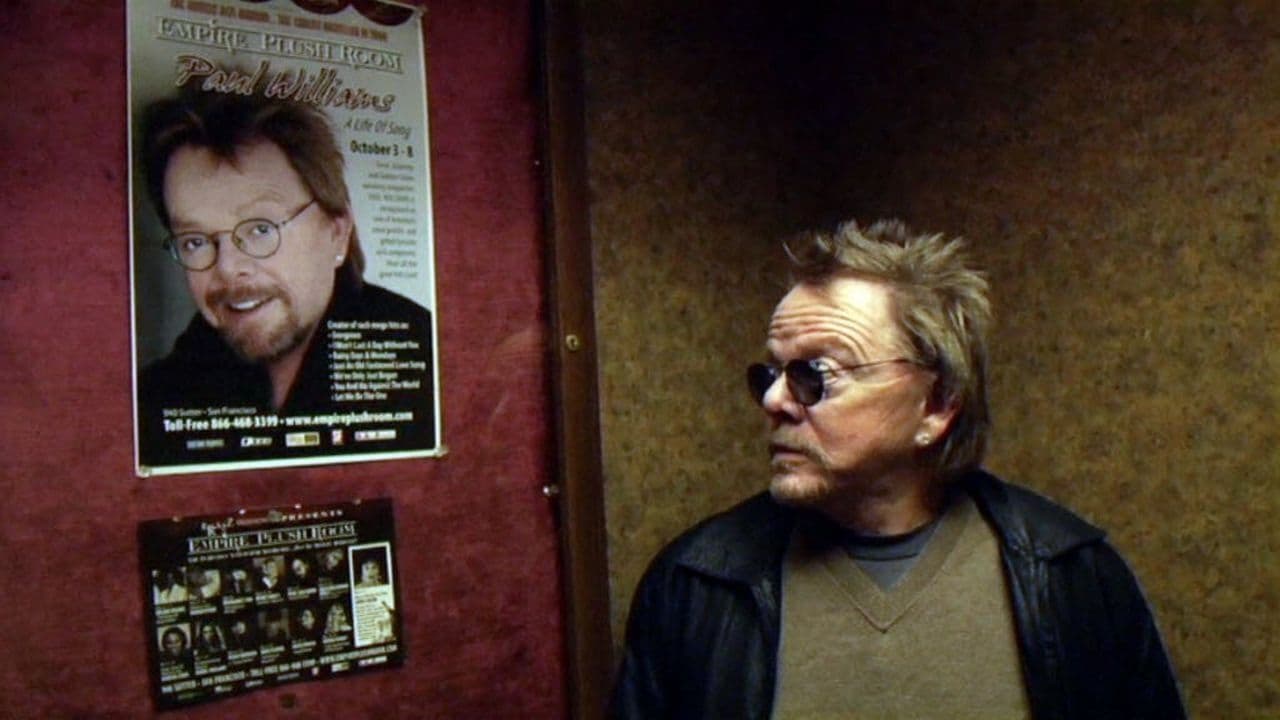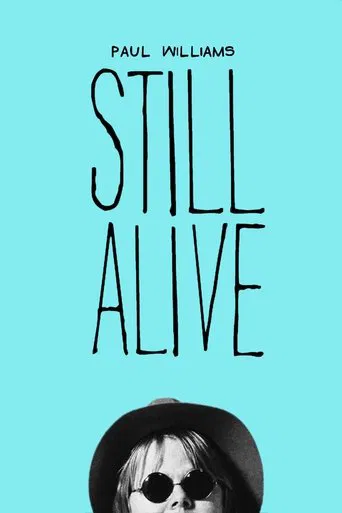

As many others my age, I just assumed that Paul Williams had passed away since he was no longer in the public eye. He was everywhere in the 70's. A truly talented songwriter, with a self aware wit, he was an excellent talk show guest. Then he disappeared. Netflix showed this documentary as a recommendation after I watch the Glen Campbell documentary and I actually think I enjoyed this documentary more.At first, it was hard to watch as the director came off as stalker-ish and often seemed disinterested when Williams was sharing more poignant aspects of his upbringing, but as the documentary progressed, Wllliams story of addiction, recovery and the discovery of true happiness shone through. I highly recommend this to anyone who has fond memories of Paul Williams in his hey day. This documentary really shows an interesting perspective on celebrity and what truly brings happiness.
... View MoreWhether realized or not, Paul Williams has had a tremendous musical impact on my generation. Easily the redeeming factor of this film are the juxtapositions of Williams in his heyday and Williams today. The documentary is populated with gasp-inducing ("I remember that!" "I saw that when it aired!") moments, terrific vintage clips, and good interviews, especially with his long-time band leader.Williams comes off completely accessible and a very self-aware guy. The tragedy of this entire project is the fact that the person at the film's helm is Stephen Kessler, who is intrusive, obnoxious, paranoid, xenophobic, and, most of all, so self-absorbed that every action Williams makes (a tour of Vegas, to the Philippines, etc.) is about him. Not 30 flippin' seconds go by in this documentary, where Kessler isn't self-referential. Williams is shockingly gracious despite Kessler's repeated attempts at "gotcha" moments. Kessler is so arrogant that he actually interrupts Williams' poignant childhood memory. He's the kind of "reporter" (term used very loosely) who isn't listening to his subject. Kessler has an agenda, and no matter how many times he refers to Williams as his "idol," that agenda is a despicable one. Kessler's "fame" (Oscar for a short film) wasn't even a blip on the entertainment scene and he is determined to make this film about him. If only Kessler had used this amazing opportunity to showcase Williams -- who is certainly as interesting and engaging as he'd been at the height of his fame -- this could have been a very remarkable film portrait. It wouldn't even have had to be a tribute; Williams shows moments of curmudgeonly behavior (and really, who wouldn't be, in Kessler's presence), but Williams' humor and undeniable talent deserve a showcase. Kessler repeatedly (and cringing-ly) keeps asking questions that are the equivalent of "how does it feel to have been so famous and to become so irrelevant?" The truly horrible moment is when Kessler (who clearly has been chomping at the bit, stalking Williams for two years for this opportunity) makes Williams awkwardly and uncomfortably sit through a late 70s-vintage television clip of a clearly high, Williams hosting the "Mike Douglas Show."Kessler wants to make a film about himself, and frame it with a compelling subject like Williams. For Williams -- who generously consented to Kessler's cameras AND provided him with boxes of videos for the documentary (without these contributions there would be absolutely no film) -- this film provides a reminder of Williams. But he deserves so much better.
... View MoreEarlier this summer, I had the unexpected pleasure of seeing Paul Williams. Yes, THAT Paul Williams. The prolific, Oscar- and Grammy-winning '70s pop composer ("We've Only Just Begun," "Evergreen," "You and Me Against the World," "Rainbow Connection," "Theme from 'The Love Boat," and many more). His name caught my attention in eighth grade, when I was starting to discover songwriters and learned that it was he who had written hits by different performers I liked. I even bought one of his albums. But then he embarked on a singing and acting career and became one of the most ubiquitous personalities on '70s TV, appearing on the Carson "Tonight Show" nearly 50 times, numerous other talk shows (Mike Douglas, Dinah Shore), game shows ("Hollywood Squares"), crime dramas (he got into a shooting match with Angie Dickinson), sitcoms, and even "Circus of the Stars" (where he jumped out of a plane). I'm sorry, but this was just too much Paul for me, and I started to tune him out.Until seeing this documentary, I never paid much attention to the person behind the stocky, five-foot-two frame, shaggy hair, tinted aviator specs, glib personality, and warbly voice. His story has the usual elements: childhood loneliness, need for acceptance, rise to A-list fame and fortune, fading star, descent into alcohol and drugs, rehab, triumph (he has been sober for 25 years), and contentment upon finally finding and accepting his place in the world.But what makes this film so compelling is that it was made by a fan of my generation who became a successful director. Although it breaks the rule that a documentarian should not inject himself into his work, the developing bond between filmmaker and subject (Stephen Kessler followed Williams, his childhood hero, for three years) proved to be a worthy secondary story. That Williams would open himself up to a stranger, and the warm friendship that developed, give the documentary a more informal, personal dimension than Ken Burns' best work, without Michael Moore-style political messages. Kessler admits to once wanting to be Paul Williams, and I found myself wanting to be Kessler — to follow a childhood hero and become buddies with him. How cool is that! "Still Alive" is a serious work, but neither Williams nor Kessler takes himself seriously, resulting in candid, funny, heartwarming moments, not to mention the film's self-deprecating title.I was intrigued by the coverage of Williams' acceptance of an invitation to perform in, of all places, the province of Mindanao in the southern Philippines — the notorious part of the country that American tourists are urged to avoid because of Al Qaeda threats. Fortunately, not only did the 8,000-mile trek proceed terror-free (including the six-hour bus ride through a jungle), but Williams felt much love from throngs of fans in this far-off land, known for its affinity for sweet, sentimental music. He had flown back to the '70s.As if the film weren't remarkable enough, what followed was a live Q&A with Williams himself, now a fit 71, and director Kessler. The audience at the Gene Siskel Film Center in Chicago was mostly middle-aged, but there were also seniors and kids, including an 11-year-old who asked the diminutive composer whom he admired growing up (Paul's answer: Mickey Rooney, because he was short, famous, and still got the girl). The graciousness, honesty, humor, wisdom, dignity, and warmth emanating from the stage exceeded my expectations. I learned that Williams' lyrics about loneliness, heartache, and hope really did come from his heart, and that he continues to be gratified by the connection that millions feel to his songs.In just two hours, I grew from simply enjoying Williams' work to admiring him, and in some ways even identifying with him. Before I go to bed tonight, I think I'll play my piano-bar rendition of "Rainy Days and Mondays." There's still hope for me yet.
... View MoreI only just re-discovered Paul Williams a year ago, although he was a clear memory from my childhood. Williams was a ubiquitous TV personality in the 1970s. And although the film will definitely appeal to nostalgia addicts of a certain age, it has more than enough good humor and emotional resonance to draw in anyone who's never heard of him (everyone's heard his songs). Kessler approaches his subject with great love, respect, and a sometimes intrusive curiosity. Williams responds at first with suspicion, then eventually trust. The growing affinity between subject and filmmaker almost becomes a second plot line - the primary one being Williams' manic career. It's edited with wit and, dare I say, pathos. I sat fairly close to the screen, and there were a few moments where shaky camera-work bothered me, but that's an inevitability whenever a filmmaker obsessively attempts to capture the essence of a childhood hero. The film also functions as a meditation on the true meaning of success and happiness. It's a lesson sorely needed in an aggressively competitive world, but the film doesn't preach. You walk away with some of the most beautiful songs ringing in your head. A beautiful film.
... View More